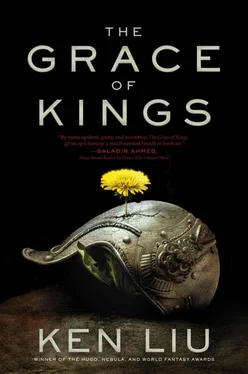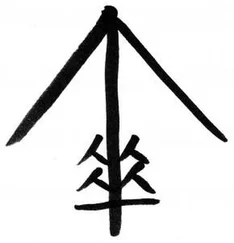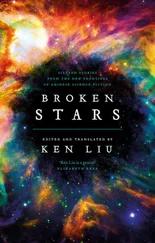Boys in Crupo’s situation generally did not have much of a future. But he was lucky that as he begged for food in the streets of Ginpen as a refugee, the great scholar Gi Anji, famed lawgiver and adviser to many kings, passed by.
Gi Anji was a busy man and, like many who lived in Ginpen, had learned to harden his heart and ignore the many street urchins and beggars who shouted tales of woe — it was impossible to determine which were telling the truth. But on that day, he saw something in little Lügo Crupo’s dark-brown eyes that moved him, a spark of yearning for something greater, not just hunger for food. He stopped and beckoned the boy to come closer.
And so Crupo became Anji’s student. He was not one of those bright boys who mastered subjects effortlessly — like Tan Féüji, the precocious son of a famous Haan scholar and Gi Anji’s favorite. And he had a hard time adapting to Anji’s school.
Anji’s favorite method of instruction was to engage in a group dialogue with his students, asking them carefully crafted questions that probed their understanding, challenged their assumptions, and led them down new avenues of thought.
Whereas Féüji could immediately come up with three different answers whenever Anji asked him a question, Crupo struggled to even understand the point Anji made by asking it. Crupo had to work hard for every bit of progress. It took him a long time to learn the zyndari letters and longer still to master enough logograms to read Anji’s simpler treatises. Often the master grew impatient with the boy and threw up his hands in despair. Conversing with the bright Féüji was so much more pleasant.
Yet Crupo persevered. He wanted more than anything to please Master Anji, and if that meant that he had to read the same book three times to absorb the meaning, that he had to practice carving and writing the same logograms a hundred times, that he had to sit and work out a parable like a puzzle for hours, he did them all without complaint. He was the very definition of diligence as he squeezed every minute out of the day to study: He read while he ate; he did not play games with the other boys; he sat on sharp pebbles instead of sitting mats so that he would concentrate instead of becoming too comfortable and falling asleep.
Gradually, Crupo became one of Anji’s best students. When speaking to kings, Anji often mentioned that of all the young men he had taught in his life, only Féüji and Crupo had understood everything he had to teach them and then gone on into the terra incognita of new ideas.
Once he left Anji’s school, Crupo tried to become an adviser to the court of Cocru, his homeland. But while the king treated him with respect, he was never given an official position. Instead, he had to support himself by lecturing and teaching.
In addition to his lectures and pamphlets, Crupo’s calligraphy was particularly admired by the literati. In contrast to his carefully constructed essays and tightly woven arguments, he shaped his wax logograms with the sensitivity of a child as well as the passionate abandon of a swordsman, and the zyndari letters from his brush leapt off the page like a flock of migrating wild geese captured in midflight over a still pond. Many imitated his calligraphy, but few could equal or even approach his artistry.
But there was a measure of condescension in their praise of Crupo that rankled. Some seemed almost surprised that a man of such humble origins could be the creator of such creative and artistic words. Behind the recognition there was also an implicit dismissal, as if Crupo’s hard work could never measure up to Féüji’s natural brilliance.
Crupo was never as famous as Tan Féüji. Tan became the Prime Minister of Haan at the age of twenty, and his essays on governance were more widely circulated and highly regarded than anything Crupo wrote. Even King Réon of Xana, the future Emperor Mapidéré, who had little good to say about scholars of the Six States, said he found Féüji’s writing enlightening.
But Crupo thought Féüji’s essays insipid. They were so flowery and illogical! All this concern about “the virtuous ruler” and the “harmonious society” and the “path of balance” nauseated him. They were constructed like castles in the air, with soaring rhetoric and lovely turns of phrase, but no care for the foundation.
Féüji’s belief in a ruler who ruled but lightly, stepping out of the way of the people, who could better their own circumstances through hard work and their own initiative, seemed to Crupo hopelessly naïve. If the experience of living in the war-torn Tiro states taught men anything, it was that the common people were little better than animals who had to be herded and corralled by strong rulers advised by men with vision. What strong states needed were severe laws administered efficiently and without mercy.
And Crupo knew that all the kings and ministers, in their heart of hearts, agreed with him , not Féüji. Lügo was the one who said what they really needed to hear, yet they continued to heap praise and honor only on Tan. His many letters to the Cocru court in Çaruza, offering his services, went unanswered.
Crupo was despondent and consumed with jealousy.
He went to Gi Anji. “Master, I work so much harder than Tan. Why am I not as well respected?”
“Tan writes of the world as it ought to be, not as it is,” Anji said.
Crupo bowed to his teacher. “Do you think I am the better writer?”
Gi Anji looked at him and sighed. “Tan writes without concern about pleasing others, and that is why men find his voice fresh and original.”
The veiled criticism stung.
One day, while at the latrine, Crupo observed that the rats in the latrine were thin and sickly. He remembered that the rats he had observed in the granary earlier were fat and lively.
A man’s circumstances are not determined by his talents, Crupo thought, but by where he chooses to put his talents to work. Xana is strong and Cocru is weak. Only a fool goes down with a sinking ship.
He defected from Cocru and went to the court of Xana, where he rose quickly because Réon thought having another student taught by Gi Anji was the next best thing to getting Tan Féuji himself.
But every time he was consulted, he heard behind the king’s words an unvoiced regret: If only Tan Féüji were sitting here with me instead…
Crupo was enraged by the thought that King Réon valued what he could not have more than what he possessed. He was constantly racked by the pain of being deemed only second best, not quite good enough. He worked even harder, trying to come up with ways to strengthen Xana and weaken the other Tiro states. He wanted the king to acknowledge, one day, that he was much more valuable than Féüji could ever have been.
After the fall of the Haan capital, Ginpen, Tan Féüji was captured.
Réon was ecstatic. “Finally,” the king boasted to his ministers, among whose ranks Crupo stood, “I will have a chance to convince a great man to join my cause. There are many in the Islands who admire his wisdom, and having him on the side of Xana would be better than a thousand horses or ten fearless generals. He is as exceptional among mere scholars as a cruben among mere whales or a dyran among mere fish.”
Crupo closed his eyes. He would never be able to escape from the shadow of this mirage, this glib man who wrote of ideals instead of truths. Even when what he said was useless, King Réon wanted the prestige of the Féüji name.
Crupo visited Tan Féüji in prison that night.
Knowing how much the king valued this particular prisoner, the guards handled Féüji more like a guest. He was given the room of the prison warden, and the guards spoke to him with respect. He was free to do as he liked as long as he did not leave.
Читать дальше












